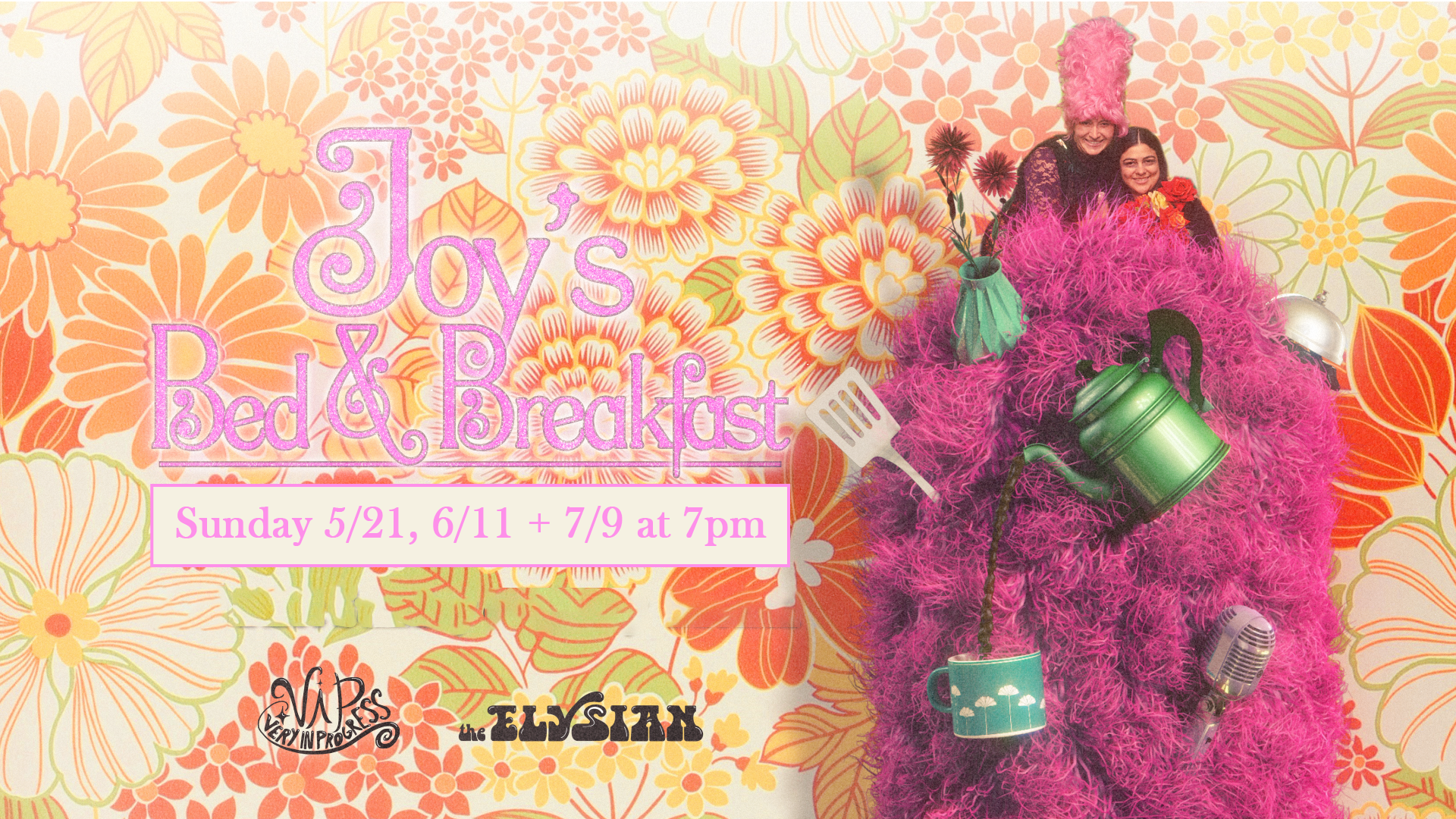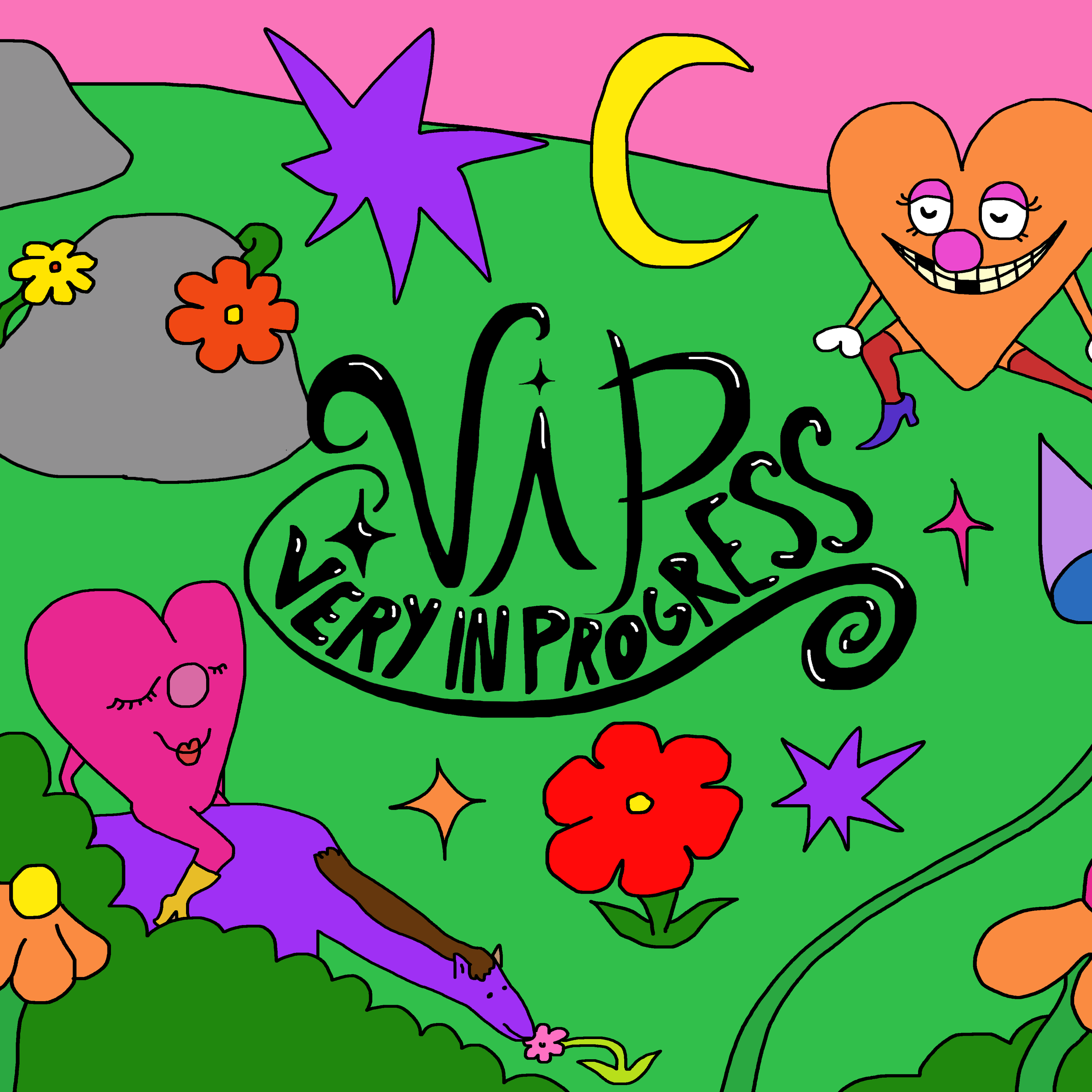Q&A with Jessy Morner-Ritt and Izzy Gerasole
Creators of Joy’s Bed & Breakfast
Written by Hannah Benson
Joy’s Bed and Breakfast is for everyone, but first and foremost it’s for Jessy Morner-Ritt and Izzy Gerasole. Watching the two friends/writers/performers/stars/Joy & Butler interact, it’s no wonder these two fill up theater seats–female friendship is delightful as hell and here’s the proof. Some are saying it’s the girl-version of the Sopranos! The show is on it’s way to the Edinburgh Fringe Festival this summer, but not before one last hoorah in its beloved home, The Elysian. Also Izzy just watched Man Men for the first time.
HB: How do you describe Joy’s Bed & Breakfast?
JMR: I describe it as a cartoon come to life, that’s what we really want out of it. It’s supposed to be a really surreal world that feels removed from everything, but then there are moments that bring you back to reality. It’s a play, but also an immersive clowning experience.
HB: How was this show birthed?
JMR: When I was in therapy in Brooklyn, my therapist asked me to visualize the parts of me that was always trying to please people, the anger for trying to please people and trying to control the environment. I was a little bored in that therapy session, so I was describing an insane woman with really high, pink hair who ran a bed and breakfast and her name was Joy. The therapist kept trying to root it back to me and I kept saying things like, “She’s wearing something beautiful.”
Originally it was a show I was doing in Brooklyn as a variety show, but I did it in this now defunct punk venue. It was a really nasty venue and I set up air mattresses and I gave people who came in little pillows and blankets, because I thought it was funny to play this woman obsessed with controlling her environment in an environment that is so obviously decrepit and falling apart. It felt really apt for my own personality. When I moved here–I always felt like the show was missing something or a part of the world that could be fleshed out better so then when I met Izzy, I decided to make it a show about a relationship with two people living in this world.
IG: It started off with us doing this improv show online in the time of Zoom shows and I was playing her friend. That part was really funny because Jessy said, “Okay you go over there and sit in the corner and I’m going to do this big intro.” And she putting her fucking heart and soul into it, doing a fighting move with a feather duster and fifteen minutes in the person running the show said, “Sorry no one was connected we didn’t have any audience.” Then I saw her do it again and I thought, she has stamina like no one has ever seen. I will never forget that experience and how hot it suddenly became in the room.
JMR: I started the show sweating, usually you get progressively sweatier, but since no one saw the first fifteen minutes, I just began dripping wet.
IG: I think it really added something.
JMR: I was originally going to do the show where I booked a bunch of different Butlers, but then Izzy did the first one and everyone realized there was no one who could be better.
HB: You’re like those actors who were only supposed to be in the pilot episode, but then the writers had to build that character because the actor was so good. What percent of you is Butler and what percent of you is Joy?
IG: That’s something as we’re making stuff for the Fringe, I want to figure out more. The part of Butler that I identify with most is the silent, long suffering. I encounter people who say dumb stuff everyday and I’ve learned to let it roll off my back, you can’t fight every battle that you come across. I like to do really big, crazy characters, I like to start with a voice or a weird movement, so that part is part of me that I don’t access in my day to day.
JMR: I feel like Butler is 40 percent you.
IG: That’s good to know.
JMR: Part of the reason I really like performing with Izzy is because Izzy is really invested in creating characters that exist outside of herself, but are connected to her in a way. I don’t have as much experience doing that, so I do think Joy is probably closer to me, my own neuroses and personhood. But as we’re developing the show I do want her to live outside and be an amalgamation of women. I love watching women fail at being women and I do feel like I fail a lot, so it’s nice to have a channel for it. I’d say Joy is probably 70 percent me.
IG: Jessy does a really amazing job of creating this character that does live outside herself, but pulling these elements from her own life that are really accessible in the way that she tells the story of it. She does a really great job of folding in those real life details and making them larger than life in the character of Joy.
HB: I’m obsessed with women creating something together, can you speak on that from this experience.
IG: Joy feels like the catalyst for the beginning of my life in Los Angeles. She asked me to do the show right around when things were opening back up after quarantine and I had moved here in January 2020, so I was kind of reeling. Jessy is the sun that rose in my life in LA and I feel so grateful. Our friendship really developed as the show developed. We didn’t know each other that well beforehand. We both come from really different backgrounds in terms of performance. Jessy is really good at all kinds of comedy–improv and stand-up. When we’re writing, spontaneity knows no bounds. I did a lot of improv in college and I’m a theater nerd at heart, so I’m always obsessed with structure–where the story is going to go and what the dialogue is going to look like. Those histories come together to showcase different parts of our personalities that also show up in the friendship too. That is something that really excited me about doing this. I never did audience interaction before Joy’s.
JMR: That’s crazy, because it looks so normal for you. Working together specifically as women and women who have both been in a lot of therapy, it does make it pretty easy to have an open and honest dialogue about the process. I don’t know if that’s necessarily rooted in gender; it’s more deeply rooted in therapy-speak. It’s easy for us to go in saying, “Okay and I’m listening,” or “And what I’m hearing you say…” And then we can switch out of it and go back to writing and creating, but it does help us both being in therapy, being women and working in customer service a lot.
IG: That’s a big part of Joy’s.
JMR: Yes, our background in trying to please the masses.
HB: The show uses clown as one of its mediums. Can you tell me about your experiences and learning of clown?
JMR: I took a couple workshops with Chad and took this Pig Iron workshop over Zoom and I loved what I was seeing, but I didn’t totally understand what it was and if I was getting any closer to being good at it. Talking to people who have been in the clowning community for a long time is really interesting because they talk about it as an art that doesn't really have a concrete end goal, you don’t know if you’re doing it right and you don’t know if you’re even doing it sometimes. It’s this nebulous thing. What we do with the show that I identify as clowning is really trying to fill out this world physically and not just through dialogue and witty one-liners. It’s playing with dynamics and space and dissolving the space between us and the audience.
IG: It’s visual storytelling, where you’re using your body to convey. In clowning, the audience is another character that you have to interact with, there’s no wall there.
HB: What should guests pack for their stay?
IG: First off, they’re going to want to pack something that Joy and Butler will like to go through their luggage and find. We do that sometimes at night.
JMR: I think they should pack an open mind for once.
IG: They should pack some plastic sheets. We get a lot of squirters, but that’s just for me to know I guess.
JMR: I try not to know that kind of thing.
IG: Bring your own fork and knife.
JMR: And bring a friend.
IG: Bring a sense of adventure.
JMR: Bring your wallet. Let’s see some money.
IG: Make it fat.
HB: Marry. Fuck. Kill. – Wine. Cheese. Pink Wig.
JMR: I would fuck cheese because it’s good for a one-night stand, but if you’re doing a whole lifetime of cheese it can really mess with the stomach like any marriage can do. Marry the pink wig. Life is really grim already and I do think you should have some pop of color. And I would kill wine, because it makes me sleepy, anxious and my voice slows down.
IG: I would also fuck cheese, no conflict there. But I’m thinking kill wig only because the synthetic fabric. I can’t have anything touching me. I can’t have a tag on or seams in my socks. I might get too itchy. Wine hopefully would let me do my own life, which would be good for me.
Book a room at JOY’S BED & BREAKFAST on Sunday 5/21, 6/11 + 7/9 at 7pm. Don’t forget your wallet–full of cash, preferably.
This performance is part of The Elysian’s VIP: Very In Progress programming.


